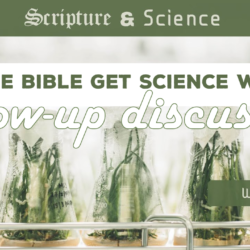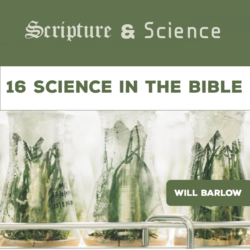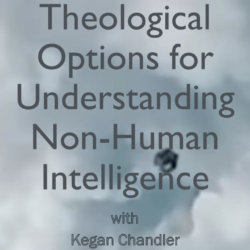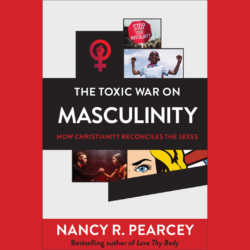Today we’re starting a new class called Scripture & Science. As a college student, studying engineering, I remember a particular day at the school library when I had the thought: “Well, I guess I’m going to have to look into scientific objections to the bible.” I had been raised a Christian and believed the bible was God-inspired and infallible. However, I was now taking lots of science and engineering courses and it seemed like all my professors were atheists. (I learned later that the smartest physics professor was actually a devout Christian.)
I was faced with a dilemma. Do I go with scripture or science? I began an investigation, purchasing and devouring several apologetics books designed to undercut evolution and the old age of the earth. I found the arguments convincing and moved on. That worked out fine for me, but plenty of others came to the opposite conclusion, choosing science over scripture.
This is a crisis young college students face over and over in the West. They ask themselves, “Do I go with God and the bible or science and reason?” If this is your situation or if you know someone who is wrestling with questions like these, this class is for you!
Our teacher is Will Barlow who double majored in Physics and Math at Vanderbilt University in Nashville, TN before going on to do graduate work. Later he pursued biblical studies and is now going into ministry full-time. His aim in this class is to survey the most common ways Christians have worked scripture and science together. His non-dogmatic approach will inform you so you can make up your own mind about what is best.
In today’s episode, Barlow explains the goals for this class and introduces a few belief systems and his general approach. Instead of seeing scripture and science as enemies locked in a battle, he thinks we should learn from both the book of the bible and the book of nature.
Listen to this episode on Spotify or Apple Podcasts
See below for notes.
—— Links ——
- Check out Barlow’s previous podcast episodes
- Learn more about and support the church Barlow and his team are starting in Louisville, KY, called Compass Christian Church
- Find more articles and audios by Barlow on his website: Study Driven Faith
- Support Restitutio by donating here
- Designate Restitutio as your charity of choice for Amazon purchases
- Join our Restitutio Facebook Group and follow Sean Finnegan on Twitter @RestitutioSF
- Leave a voice message via SpeakPipe with questions or comments and we may play them out on the air
- Intro music: Good Vibes by MBB Attribution-ShareAlike 3.0 Unported (CC BY-SA 3.0) Free Download / Stream: Music promoted by Audio Library.
- Who is Sean Finnegan? Read his bio here
—— Notes ——
About Will Barlow:
Interested in faith/science discourse since childhood
Bachelor’s degree in Physics/Mathematics
Master’s degree in Secondary Education (STEM focus)
Published God & Science book in late 2016
Future head pastor of Compass Christian Church
Goals for this class:
Learn about different ways to interpret Genesis 1
Learn about current views in physics, biochemistry, and geology
Think more about miracles, and how we define a miracle
Think about multiple ways to reconcile the Bible and science
Be prepared to tell those outside the faith that multiple options exist
Why present multiple options?
1 Peter 3:15 but in your hearts honor Christ the Lord as holy, always being prepared to make a defense to anyone who asks you for a reason for the hope that is in you; yet do it with gentleness and respect
When are multiple options better than one?
Churches of Christ motto:
“In essentials, unity; in non-essentials, liberty; in all things, charity.”
Scenario One:
A current agnostic who thinks that all Christians are Youth-Earth creationists. This person believes in evolution. If all you know is Young- Earth creationism, and you don’t know that some Christians believe in evolution, how can you overcome that objection?
Scenario Two:
A former Christian who grew up in a church but doesn’t remember much about how to reconcile science and faith. This person has a vague feeling about how seriously we should take the text and is suspicious of “non-literal” interpretations. If you take a non-literal view of Genesis 1 and don’t know about the other options, how can you effectively help this person?
What is a belief system?
According to Collins Dictionary, a belief system is “the set of beliefs that people have about what is right and wrong and what is true and false.”
According to Oxford Dictionary, a worldview is “a particular philosophy of life or conception of the world.”
Examples of Popular Belief Systems
Scientific Atheism
NOMA — science and religion simply don’t mix
Theism mixed with distrust of science
“God of the gaps”
What if there is a better way?
Truth Seeking
From my perspective, truth-seeking is a never-ending process.
To be a truth-seeker, we must constantly challenge our beliefs, which means we also may be challenging our filters (our belief system, our worldview).
How do we decide what the best worldview is? How do we decide what the best belief system is?
My Bias
I believe that God has revealed himself in several ways
Through the Bible
Through the lives of men and women throughout time
Through nature
“Two books” philosophy – Bible and nature
Has God revealed himself through nature?
Romans 1:20 For his invisible attributes, namely, his eternal power and divine nature, have been clearly perceived, ever since the creation of the world, in the things that have been made. So they are without excuse.
Psalms 19:1-2 The heavens declare the glory of God, and the sky above proclaims his handiwork.
Day to day pours out speech, and night to night reveals knowledge.
Scripture vs. Science
Scripture:
Eternal truth
Wisdom
Historical account of Hebrew people, Jesus, and early Christians
How to have a relationship with God, Christ, and others
Science:
Pursuit of understanding of the world around us
Knowledge
Process-driven
How to understand the mechanics of the world and universe around us
Famous Christian Scientists:
Galileo
Kepler
Pascal
Newton (Arian!)
Maxwell
Mendel
Lemaitre
Heisenberg von Braun
Katherine Johnson
Polkinghorne
What is our assumption about the Bible?







Excellent.
A number of additional points :
1. Individual Scientists have different “world views ” which affects how they define ‘Science’. Is parapsychology, for example, a science?; And does ‘Morphic Resonance’ theory have any scientific credibility? Different scientists will say different things – often depending upon their own underlying ‘world view’ presuppositions.
1. Will Barlow extolls the maxim :
” In essentials, unity; in non-essentials liberty; ..”
The question is however, what exactly are the absolute “essentials” ?
My own ‘bottom-line’, essentials are only two :
(i). That Jesus was uniquely resurrected from the dead, with divine power, by God (Romans 1:4);
And,
(ii). It is spiritually imperative for a person to have Christ Jesus living within them, via the Spirit of God (Romans 8:9-14).
essent
Will Barlow effectively makes excellent points that genuine ” Truth seekers ” are engaged in a lifelong spiritual and intellectual journey; and ideally, they should always be prepared to change their theological views minds, as a result of further studies and reflection.
Typo Correction :
” Finally, Will Barlow implies the excellent point that all ‘Truth seekers’ and/or ‘Truth claimers’, should ideally be engaged upon a life-long spiritual and intellectual journey – and they should always have the humility to change their Christian theological views, as a result of further in-depth study and consequent refection.”
Some of you may have noticed the following very recent stories concerning the so-called “Big Bang” reported in both secular and Christian media lately. Here are a few …
“James Webb Telescope’s Discovery of Galaxies That Shatters the Big Bang Theory”
https://youtu.be/tmlpVSPd6Rc
“Evolutionists PANIC Over James Webb Telescope Pics”
https://youtu.be/HjmkDgE0MpQ (first 9 mins)